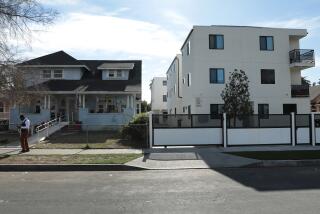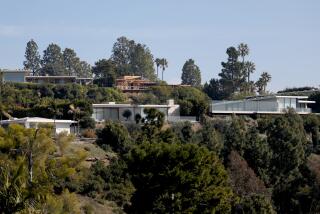Filming ban stirs up L.A. neighborhood
Adrine Andreasian was thrilled last August when a man identifying himself as a “location scout” for the NBC television series “Law & Order: Los Angeles” knocked on the door of her newly remodeled Mediterranean-style home in Los Feliz Estates and asked about using the house in an episode. The shoot would last three days, and the production company would pay the homeowner about $30,000.
“We could have paid our mortgage down or used it toward our property taxes,” said Andreasian, 46, who owns a manufacturing business in Glendale with her husband. Neighbors among the nearly 200 residents of the quiet community of tailored landscaping, wide streets, security cameras and expansive views of downtown had lent their houses to movies, television shows and commercials in recent years and collected the benefits.
But Andreasian’s excitement was short-lived. The community’s general manager vetoed the proposal. Andreasian was an early casualty of a ruling by the five-member homeowners association board barring homeowners from renting out their homes for filming. The ban, unusual among nongated communities in Los Angeles, has stirred resentment in the exclusive enclave and talk of a lawsuit.
The pros and cons under debate in Los Feliz Estates would be recognized by many people who live in neighborhoods popular with the industry: Is it fair for a homeowner to reap the thousands of dollars that can come with a shoot while neighbors gain only the inconvenience of dodging trucks and tripping over cable? How much traffic can a residential neighborhood sustain? Does the cool factor of having a movie star working in the neighborhood offset having to put up with the scruffy-looking guy in the baseball cap and T-shirt who keeps carrying stuff across your front lawn?
But if the dispute is somewhat familiar, it appears more intense here and it comes at an inauspicious time for the city as it battles to keep production away from other states — and countries — that offer heavy financial incentives to lure filmmakers.
“Clearly, the objective is to keep L.A. film friendly, and this kind of statement goes in the opposite direction and gives fodder to those who try to find excuses to leave L.A. and take their business elsewhere,” said Paul Audley, president of FilmL.A. Inc., the nonprofit film-permitting group that recently launched a marketing campaign promoting the local film industry.
The hillside community is quiet and affluent, with large houses of varying ages and styles. In addition to professionals, business owners and retirees, Los Feliz Estates is home to some who work in the entertainment industry, including Academy Award-winning producer-director Steven Soderbergh (“Traffic,” “Erin Brockovich,” “Ocean’s Eleven”), who declined to be interviewed for this story.
In fact, the subject of filming is a taboo topic, with many residents reluctant to broach the subject publicly for fear of offending neighbors, associates or family members with ties to Hollywood. One board member and staunch proponent of the film ban called the association’s security service when a reporter knocked on her door for an interview.
“We just don’t like it,” said an 83-year-old woman who has lived in Loz Feliz Estates since 1981 and spoke on condition of anonymity. “We moved up here because we thought it was a quiet area — nothing like this. You don’t know who these people are who are coming and going.”
For all the hubbub, Los Feliz Estates never has been a hotbed of production. It doesn’t even rank among the top 10 film communities in L.A., attracting fewer than a dozen productions since 2008.
Todd Murray, a jazz singer and real estate investor, and his partner, an actor, have made about $40,000 in the last two years renting their contemporary two-story house for filming. Their biggest project was a five-week shoot for the Zac Efron movie “17 Again” in 2008, when crew members took over the house and paid for a temporary apartment for Murray. Several neighbors also received cash payments for housing extras and giving up their driveways for crafts services. “I got no complaints from neighbors. People enjoyed it,” said Murray.
But in February of last year producers of the Comedy Central show “Nick Swardson’s Pretend Time” worked in the neighborhood and everything changed. The board said producers refused to pay the “agreed donation” to the association (such donations are customary though not required), parked where they shouldn’t have and brought in more than twice as many trucks as promised. “One company’s bad behavior … led the board to look more closely at our past practices,” the association wrote in its newsletter.
Bruce Carroll, the association’s secretary and a retired network news producer for ABC, said he was startled when he spotted a crew member from the show smoking a cigar in front of his house across the street from a truck that was fueling a generator. A sign on the truck said “Flammable Engine. Stop Engine. No smoking within 50 feet.”
“I thought they didn’t show the proper care they should have for working in somebody’s neighborhood,” said Carroll, who favors allowing filming but with restrictions.
Jesse Cole, a location manager for the series, said producers fully complied with their permit issued by FilmL.A., and didn’t renege on a payment to the association. He said he paid a “donation” of $1,000. “They were expecting $2,000 for a two-day shoot, which is abnormally high,” he said. “It started to feel like extortion.”
After reviewing the film policy and consulting with their attorney, board members concluded that homeowners who received payment for filming were violating an association covenant that prohibits “commercial use” of any properties. The board then sent notices to homeowners like Murray, informing them that filming was off-limits, and set up a neighborhood referendum asking residents if they wished to amend the community’s rules to allow filming with restrictions, such as limiting filming to 10 days a year, or upholding the ban on all filming. The balloting sparked a barrage of campaign fliers on both sides, but only about half the residents voted. In the final count Nov. 30, 51 residents voted for filming and 42 against. The yes vote fell well short of the 98 required to approve any change in the covenants. The ban on filming remained, but it has left bitter feelings.
“I’ve only done this seven times in nine years, so I don’t think I’m running a business,” said Martin Zeidner, 78, a retired business owner who has rented out his house for filming. He says the association is selectively enforcing its rules, allowing some homeowners, for example, to rent out their homes. “How is that not a commercial activity?” Murray, who is considering a legal challenge to the board’s decision, says, “They’re limiting my rights as a homeowner.”
Association general manager Glenn Purdy and president Bruce Jay declined to comment, but Martin Lee, the Laguna Hills attorney who represents the association, said the board “isn’t on a warpath to spy on people who are filming, but there were some owners who had their property listed on websites as available for filming and listing their rates. When it becomes obvious that a commercial activity is going on, then it’s a violation of the CC&Rs [the covenants, conditions and restrictions].”
The IRS considers film rental income tax-free if it involves a payment of less than $25,000 and fewer than 15 days of filming. Self-governing associations like Los Feliz Estates, however, are legally entitled to adopt their own rules and restrictions.
The ban hit home for Michael Williams, a resident of Los Feliz Estates and executive producer of the HGTV show “The Outdoor Room.” Williams wanted to do a landscape makeover at one of the homes in the neighborhood, but his request was denied.
“I was really kind of shocked and embarrassed,” said Williams. “This show has no film trucks, no generators and no lights, just a truck for plant materials. We were going to leave behind this beautiful yard for this couple and their child.”
More to Read
The biggest entertainment stories
Get our big stories about Hollywood, film, television, music, arts, culture and more right in your inbox as soon as they publish.
You may occasionally receive promotional content from the Los Angeles Times.







